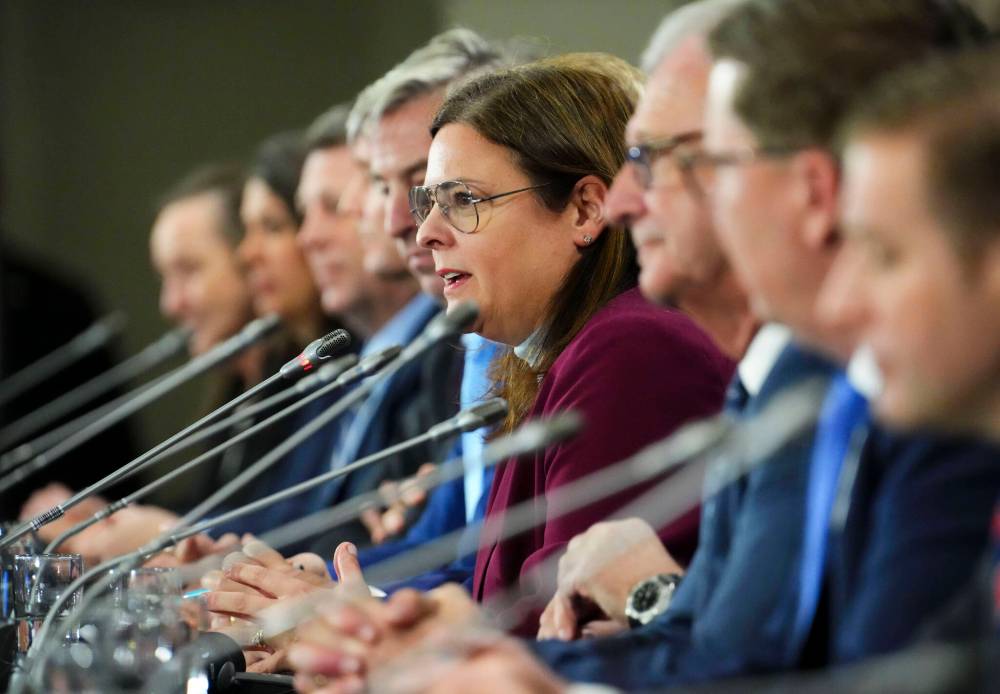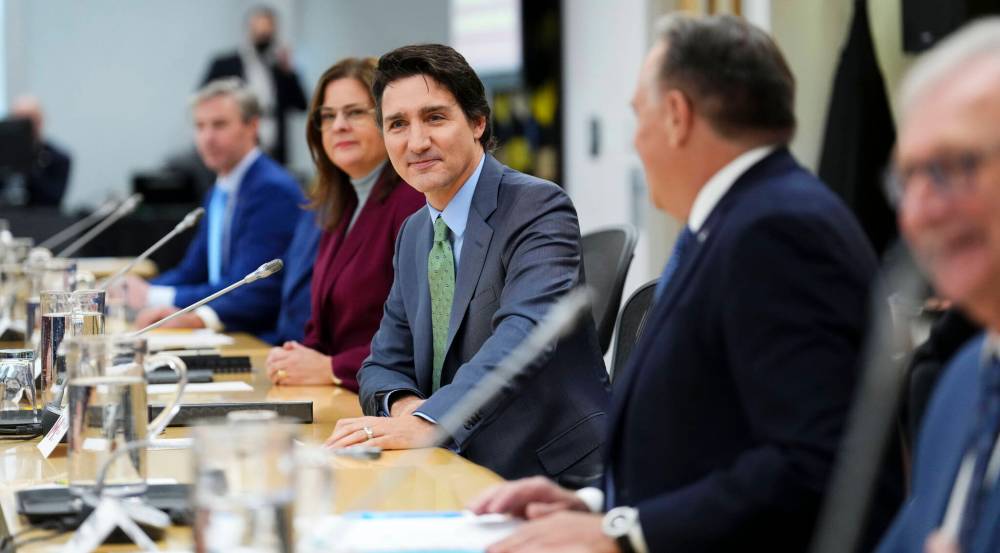‘Devil’s always in the details’
Manitoba must analyze fine print before agreeing to health funding pitch
Advertisement
Read this article for free:
or
Already have an account? Log in here »
To continue reading, please subscribe:
Monthly Digital Subscription
$1 per week for 24 weeks*
- Enjoy unlimited reading on winnipegfreepress.com
- Read the E-Edition, our digital replica newspaper
- Access News Break, our award-winning app
- Play interactive puzzles
*Billed as $4.00 plus GST every four weeks. After 24 weeks, price increases to the regular rate of $19.95 plus GST every four weeks. Offer available to new and qualified returning subscribers only. Cancel any time.
Monthly Digital Subscription
$4.99/week*
- Enjoy unlimited reading on winnipegfreepress.com
- Read the E-Edition, our digital replica newspaper
- Access News Break, our award-winning app
- Play interactive puzzles
*Billed as $19.95 plus GST every four weeks. Cancel any time.
To continue reading, please subscribe:
Add Free Press access to your Brandon Sun subscription for only an additional
$1 for the first 4 weeks*
*Your next subscription payment will increase by $1.00 and you will be charged $16.99 plus GST for four weeks. After four weeks, your payment will increase to $23.99 plus GST every four weeks.
Read unlimited articles for free today:
or
Already have an account? Log in here »
Hey there, time traveller!
This article was published 07/02/2023 (1107 days ago), so information in it may no longer be current.
Manitoba Premier Heather Stefanson said she isn’t prepared to sign off on the federal government’s 10-year, $196-billion health funding proposal just yet.
She said Tuesday she needs more time to “digest” details of the offer.
“We’ve had a proposal on the table for the last two-and-a-half years,” Stefanson said in an interview after the premiers met with Prime Minister Justin Trudeau in Ottawa. “We’ve only had a proposal from the federal government for the last two and half hours.”
The Manitoba premier chairs the Council of the Federation, the 13 provincial and territorial leaders that has lobbied Ottawa since 2020 to increase its share of health care funding to 35 per cent from the current 22 per cent.
THE CANADIAN PRESS / SEAN KILPATRICK Manitoba Premier Heather Stefanson said she isn’t prepared to sign off on the federal government’s 10-year, $196-billion health funding proposal just yet. 
Stefanson said the premiers will head home to discuss the proposal with their health officials and ministers and will reconvene after that.
The premier said the additional money offered by Ottawa is “not a significant amount” and works out to 24 per cent of health costs.
“We were a little disappointed… especially when they were talking about big dollars. Again we’ll have to digest that. ”
Premiers will discuss the offer ahead of the federal budget, she said. No date for the budget has been announced.
About one-quarter of the offer, $46 billion, is new money. It includes a promise to increase the annual Canada Health Transfer faster over the next decade and targeted funding for priority areas such as mental health, surgical backlogs and family medicine.
In return, provinces and territories will have to improve how health information is collected, shared and reported, to improve transparency.
Manitoba Health Minister Audrey Gordon said in November that she and her provincial counterparts were demanding “no strings attached” to increases in federal funding. On Tuesday, Stefanson said Manitoba needs to get into the “finer details” of the proposal “just to see what does that mean in terms of strings.”
Her government doesn’t take issue with collecting and sharing health data, she said. “I think whatever offers more transparency and accountability is a good thing.”
She said it’s uncertain what the federal government wants.
THE CANADIAN PRESS / SEAN KILPATRICK The deal offered by Prime Minister Justin Trudeau and the federal government was less than Canadian premiers were hoping for, only working out to around 24 per cent of health costs, Stefanson said.
“Will that be further investments in (the Canada Institute for Health Information) or what will that look like in terms of a database and sharing?”
For the most part, though, Manitoba would be open to that, she said.
The premier wasn’t ready yet to jump at the federal government’s offer of $25 billion in separate bilateral deals that target areas such as primary health care, staff shortages and surgery backlogs, mental health and substance use, and health system modernization. Those side deals require provinces to report on how the money will be spent and how results will be measured.
“The devil’s always in the details of these bilateral deals,” Stefanson said. “We’re going to have to sit down and have those discussions with the federal government from Manitoba’s perspective.”
The Manitoba Health Coalition wonders how many separate bilateral deals the province would be allowed to make with Ottawa.
“I can’t think of an area in Manitoba health care that doesn’t need urgent support right now, from our emergency rooms to our operating rooms to home care, long term care, our rural ambulance network,” spokesman Thomas Linner said. “All these kinds of areas are under a huge crush and mostly due to the same issue of understaffing and underfunding for years in the face of a pandemic,” he said.
Stefanson couldn’t say if the increased federal funding must be spent on health care or the public health care system.
“We need to take the time to ensure we know and understand what is in the details of these proposals.”
The coalition said it wants stricter guidelines to ensure provinces spend the federal funding on front-line services.
“(In Manitoba) we have seen the provincial government pursue over a billion dollars in tax cuts through a pandemic and a health-care staffing crisis,” Linner said.
The president of Doctors Manitoba said they’re encouraged the prime minister met with the premiers and identified priority areas, but the money offered is not nearly enough.
“Our initial analysis of the federal offer is that it will only fund a fraction of what’s needed to get Manitobans and Canadians the care they deserve and repair our health care system,” Dr. Candace Bradshaw said Tuesday.
“We hope to see the dialogue between provinces and the federal government continue, with a focus on addressing the major shortage of physicians and nurses, unreasonably long wait times, and helping the 150,000 Manitobans who don’t have a family doctor,” Bradshaw said.
The Assembly of Manitoba Chiefs, meanwhile, is disappointed it wasn’t at the table with federal and provincial leaders.
“We see, first-hand, how this current health-care system is failing our people despite the fact we have a treaty right to health,” Grand Chief Cathy Merrick said in a news release.
— with files from The Canadian Press
carol.sanders@freepress.mb.ca

Carol Sanders
Legislature reporter
Carol Sanders is a reporter at the Free Press legislature bureau. The former general assignment reporter and copy editor joined the paper in 1997. Read more about Carol.
Every piece of reporting Carol produces is reviewed by an editing team before it is posted online or published in print — part of the Free Press‘s tradition, since 1872, of producing reliable independent journalism. Read more about Free Press’s history and mandate, and learn how our newsroom operates.
Our newsroom depends on a growing audience of readers to power our journalism. If you are not a paid reader, please consider becoming a subscriber.
Our newsroom depends on its audience of readers to power our journalism. Thank you for your support.





